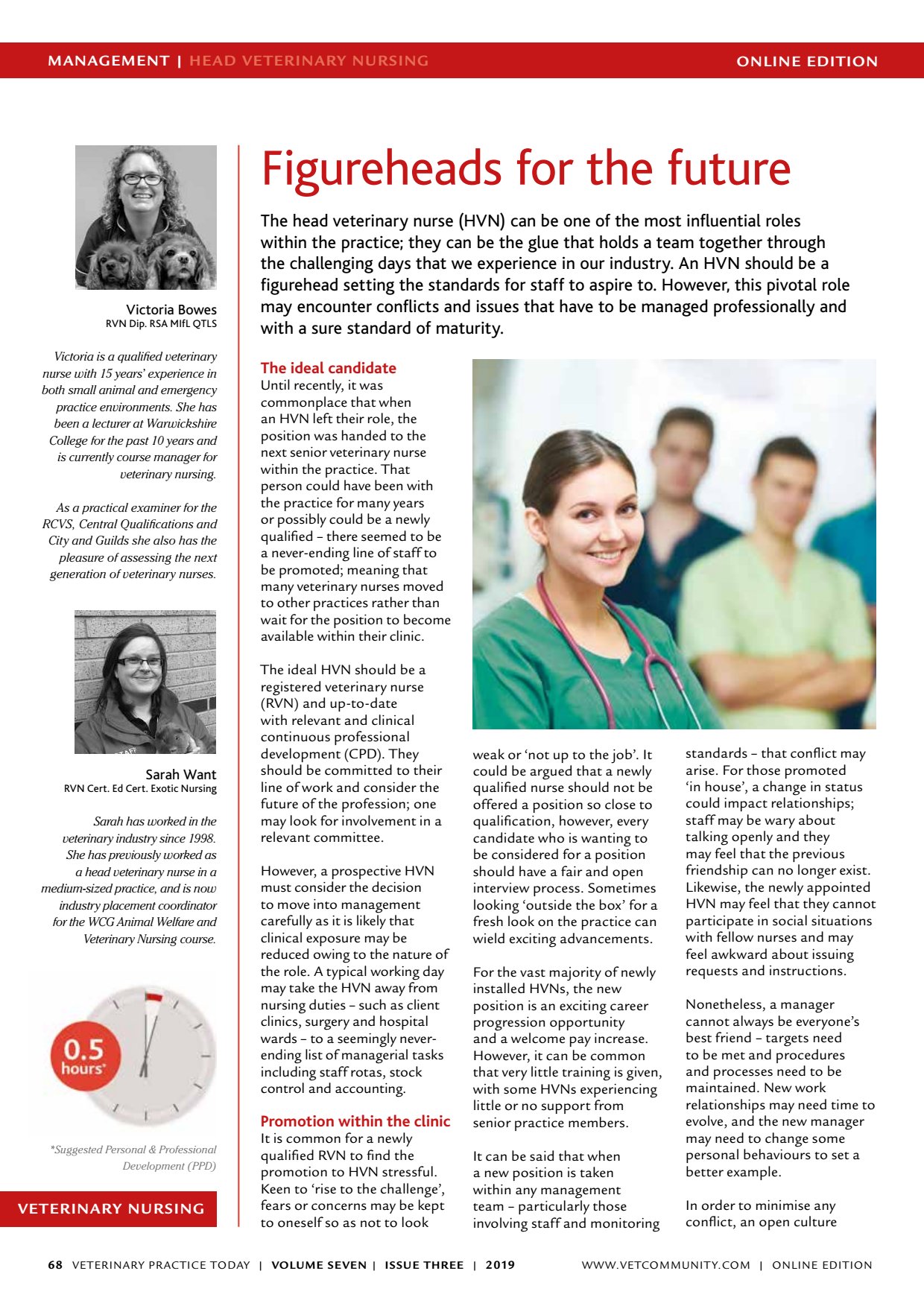Figureheads future ideal
ONLINE EDITIONMANAGEMENT | HEAD VETERINARY NURSING VETERINARY PRACTICE TODAY | VOLUME SEVEN | ISSUE THREE | 2019 68 VETERINARY NURSING Suggested Personal & Professional Development (PPD) Figureheads for the future The head veterinary nurse (HVN) can be one of the most influential roles within the practice; they can be the glue that holds a team together through the challenging days that we experience in our industry. An HVN should be a figurehead setting the standards for staff to aspire to. However, this pivotal role may encounter conflicts and issues that have to be managed professionally and with a sure standard of maturity. The ideal candidate Until recently, it was commonplace that when an HVN left their role, the position was handed to the next senior veterinary nurse within the practice. That person could have been with the practice for many years or possibly could be a newly qualified there seemed to be a never-ending line of staff to be promoted; meaning that many veterinary nurses moved to other practices rather than wait for the position to become available within their clinic. The ideal HVN should be a registered veterinary nurse (RVN) and up-to-date with relevant and clinical continuous professional development (CPD). They should be committed to their line of work and consider the future of the profession; one may look for involvement in a relevant committee. However, a prospective HVN must consider the decision to move into management carefully as it is likely that clinical exposure may be reduced owing to the nature of the role. A typical working day may take the HVN away from nursing duties such as client clinics, surgery and hospital wards to a seemingly never- ending list of managerial tasks including staff rotas, stock control and accounting. Promotion within the clinic It is common for a newly qualified RVN to find the promotion to HVN stressful. Keen to rise to the challenge, fears or concerns may be kept to oneself so as not to look weak or not up to the job. It could be argued that a newly qualified nurse should not be offered a position so close to qualification, however, every candidate who is wanting to be considered for a position should have a fair and open interview process. Sometimes looking outside the box for a fresh look on the practice can wield exciting advancements. For the vast majority of newly installed HVNs, the new position is an exciting career progression opportunity and a welcome pay increase. However, it can be common that very little training is given, with some HVNs experiencing little or no support from senior practice members. It can be said that when a new position is taken within any management team particularly those involving staff and monitoring standards that conflict may arise. For those promoted in house, a change in status could impact relationships; staff may be wary about talking openly and they may feel that the previous friendship can no longer exist. Likewise, the newly appointed HVN may feel that they cannot participate in social situations with fellow nurses and may feel awkward about issuing requests and instructions. Nonetheless, a manager cannot always be everyones best friend targets need to be met and procedures and processes need to be maintained. New work relationships may need time to evolve, and the new manager may need to change some personal behaviours to set a better example. In order to minimise any conflict, an open culture Victoria Bowes RVN Dip. RSA MIfL QTLS Victoria is a qualified veterinary nurse with 15 years experience in both small animal and emergency practice environments. She has been a lecturer at Warwickshire College for the past 10 years and is currently course manager for veterinary nursing. As a practical examiner for the RCVS, Central Qualifications and City and Guilds she also has the pleasure of assessing the next generation of veterinary nurses. Sarah Want RVN Cert. Ed Cert. Exotic Nursing Sarah has worked in the veterinary industry since 1998. She has previously worked as a head veterinary nurse in a medium-sized practice, and is now industry placement coordinator for the WCG Animal Welfare and Veterinary Nursing course. WWW.VETCOMMUNIT Y.COM | ONLINE EDITION
